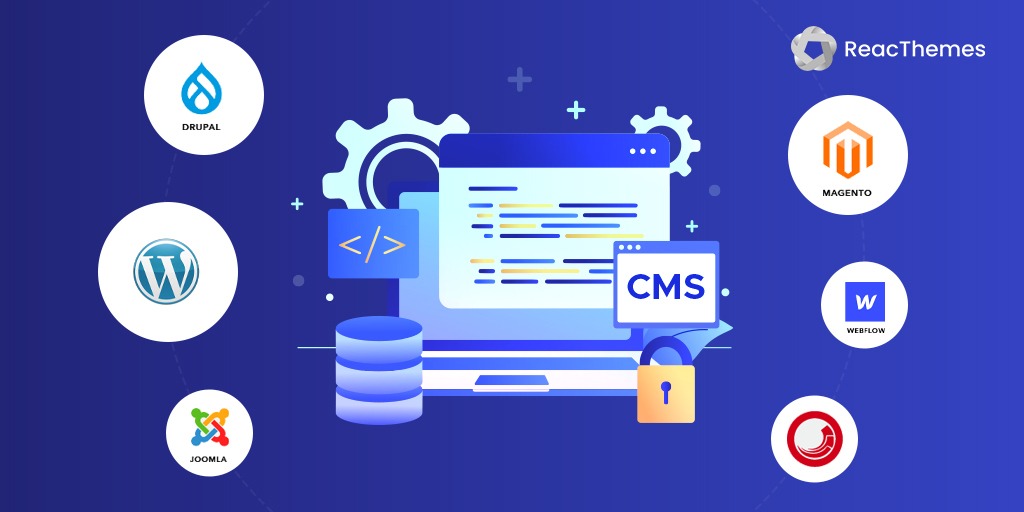If you are a website owner, chances are you have heard the term “CMS” before. But what exactly is it? A content management system (CMS) is a software system that allows users to create and manage digital content. Not only can CMS provide an easier way to keep content up to date, but it also provides many other benefits as well. In this article, we will be discussing why you should use CMS for your website or blog.
What is CMS?
A Content Management System (CMS) is a web-based software application designed to create, edit and manage content on a website. It enables users who are not familiar with HTML coding to update content quickly and easily on their own. A CMS simplifies the process of creating, editing, publishing, and maintaining websites by providing an intuitive interface for users to use without having to learn web development languages or techniques.
Today, CMSs are used across many industries for tasks such as managing product catalogs, tracking customer interactions, managing employee information, and even running entire e-commerce stores. Popular CMSs include WordPress, Joomla!, Drupal, and Magento which offer powerful features like drag-and-drop editors that make it easy for businesses to create dynamic websites with minimal effort. Now let me introduce you to some of the most popular CMS out there in the universe.
WordPress

WordPress is a web-based, open-source content management system that is used to create and manage website or blog content. It allows users to create a wide range of websites, from e-commerce sites to simple blogging platforms. WordPress also offers many customization tools and themes, making it an ideal choice for both beginners and experienced developers alike.
WordPress was initially released in 2003 by its founders Mike Little and Matt Mullenweg. Since then, it has grown into one of the most popular website creation tools on the market with millions of users worldwide. With its user-friendly interface and customizable options, WordPress makes it easy for anyone to build their own website or blog in minutes. Additionally, WordPress has a large community of contributors who help maintain the platform by providing support and updates to ensure it remains secure and up-to-date.
Joomla

Joomla is a free and open-source content management system (CMS) for publishing web content. It is built on a model–view–controller web application framework that can be used independently of the CMS. Joomla is written in PHP and it uses object-oriented programming techniques (OOP). It stores data in a MySQL or MS SQL database and includes features such as page caching, RSS feeds, printable versions of pages, news flashes, blogs, polls, search, and support for language internationalization.
Joomla is designed to be easy to install and set up even if you don’t have technical skills, and it offers a wide range of customizable templates and extensions to add functionality to your website. It’s suitable for small to medium-sized websites, online stores, and intranet applications, and it’s widely used by government, corporate, and non-profit organizations.
Drupal

Drupal is a powerful yet flexible content management system (CMS) used by web developers around the globe. This free, open-source platform allows users to build and manage their websites with ease and simplicity. Drupal offers a variety of benefits for individuals who wish to create effective websites without having to code from scratch.
Developers appreciate Drupal’s ability to easily customize websites through modules and themes that are available for download or custom creation. The level of control offered by the CMS makes it an ideal choice for complex sites that require more than just basic features. Additionally, users can benefit from its user-friendly interface that simplifies website administration tasks such as setting up content types, organizing menus, and managing access permissions.
Why Should You Use CMS for Your Website?
If you’re looking to build a website, using a content management system (CMS) is the way to go. CMS platforms allow users to quickly and easily create, manage and update websites without requiring knowledge of coding. Using a CMS can save businesses time and money while providing them with many powerful features. Here are the reasons why you should use CMS for your website:
No coding skill is mandatory
Creating a website is no longer a daunting task, even if you don’t have any coding or design skills. Content Management Systems (CMS) are the perfect solution for those who want to build an attractive and functional website with ease. CMS provides all the tools necessary to create a professional-looking website with no need for coding experience.
A CMS allows users to quickly create, edit and publish content on the internet without having an in-depth understanding of HTML or other programming languages. With easy-to-use templates, drag-and-drop features, and powerful customization options available through themes, you can craft your own unique site in no time at all. Plus, most CMS are hosted on servers so there’s no need to purchase web hosting services or install software locally—it’s all taken care of for you!
User-friendly interface
CMS platforms provide an easy-to-use interface that is designed to make building and managing your website as simple as possible.
A user-friendly interface is essential when creating any kind of digital product or content. It should be intuitive and easy to navigate – especially for those who may not have technical knowledge. A great example of this type of platform is WordPress, which has become one of the most popular CMSs in use today due to its simplicity and flexibility.
Easy to update and manage content
CMSs provide a user-friendly platform that allows for convenient updates and modifications of website content. By using a CMS, users can save time, money, and effort in managing their website’s content without needing any technical or coding knowledge.
A CMS offers several features that make it easier to manage your website’s content. Many CMS packages come with sophisticated editing tools which allow users to quickly create, change and delete text on their site without having to know HTML or any other programming language.
Improved website structure
For businesses that rely on their website to reach customers, having a well-structured site is essential. A content management system (CMS) can be an effective way to improve the structure of any website. CMSs provide users with the flexibility to manage and create content as needed while preserving a consistent look and feel throughout the entire site.
Using a CMS allows for changes or updates to be made without affecting other areas of the website. This ensures that no matter how many times something changes, visitors can always find what they need quickly and easily. Additionally, it makes it easier for businesses to control who has access to specific parts of their sites, preventing unauthorized edits from occurring. CMSs also allow webmasters to customize their websites with plugins and themes which give them more control over how the finished product looks and functions.
Better management of metadata
Metadata plays an important role in the success of any website. It’s the information used to describe and organize content, making it easier for search engines to understand and index your web pages. But managing metadata can be tricky, especially if you’re relying on manual processes or outdated tools. Fortunately, content management systems (CMS) offer a more efficient way to manage your metadata and give you better control over how it’s presented online.
Using a CMS for your website gives you access to powerful features that make it easier to create and manage metadata. You can set default values for certain fields such as titles or descriptions, so you don’t have to manually enter them each time you create a new page or post. Additionally, many CMSs allow users to easily add custom meta tags with specific instructions for search engines like Google and Bing.
Ability to add new features and functionality
As the digital world continues to grow and evolve, the need for websites that are easily managed and updated becomes more important. Content Management Systems (CMS) offer website owners the ability to add new features and functionality. CMS platforms allow users to make changes quickly, making them an ideal choice for those who wish to update their web content frequently.
The variety of features offered by a CMS platform makes it easy for website owners to add new elements as needed. From drag-and-drop tools that make it possible to create pages with a few clicks of the mouse, to custom page templates that provide a template for creating unique layouts, CMS can meet any need. In addition, users can also take advantage of plugins or extensions that add even more functionality such as online shopping carts or contact forms.
Supports growth of website traffic
A CMS can also provide features like easy-to-use web page editing tools, search engine optimization capabilities and content analytics which can help you track how visitors interact with your site. This makes it easier to identify trends in user behavior and develop strategies for increasing website traffic. Additionally, using a CMS helps keep your site up-to-date with current technologies such as mobile device compatibility or social media integration which are essential for engaging customers online.
Supports multiple languages and currencies
Using a content management system (CMS) for your website can be extremely beneficial if you need to support multiple languages and currencies. CMSs are designed specifically to allow websites to easily incorporate multiple languages, making them the perfect choice for anyone looking for a way to reach an international audience. Additionally, some CMSs provide built-in currency conversion capabilities. This allows visitors from outside of your home country to view prices and other information in their local currency, providing a more convenient shopping experience.
Regular security updates
Having a secure website is one of the most important aspects of running an online business. Regular security updates are necessary to ensure that your customers’ information and data is safe from malicious activity. With regular security updates, you can help protect against malware, hackers, and other cyber threats.
Using a content management system (CMS) for your website is a reliable way to keep up with regular security updates. CMS websites such as WordPress, Joomla, and Drupal offer frequent security patches so that you stay ahead of potential threats. They also provide additional features such as plugins that can further increase the safety of your site by controlling user access levels and allowing for user authentication steps when logging in or making changes to your site. Additionally, using a CMS gives you access to experienced professionals who can provide ongoing monitoring and support for any technical issues you may experience regarding the security of your website.
Data backup and recovery options
Data backup and recovery is a critical part of any website. It ensures that important information is not lost in the event of an emergency or system malfunction. For businesses, it’s even more important to ensure data security is maintained as it can have a major impact on their bottom line. One of the most effective ways to ensure your web data is secure is by using content management systems (CMS).
A CMS allows you to store, manage and monitor data for your website efficiently and securely. This means that if anything ever happens to your site, you will be able to quickly restore the necessary information from the backups stored within the CMS. Additionally, CMSs usually come with built-in security features such as two-factor authentication and encryption so that only authorized users can access sensitive data.
Built-in features and integrations
A key benefit of using a CMS for your website is its built-in features. It comes with pre-installed plugins that provide you with more options than traditional web development methods. For example, if you want to add an image gallery or video player to your site, there are plugins available in the CMS that will help you do this quickly and easily without any coding knowledge required. Additionally, many CMS systems come with security features like authentication mechanisms so you can keep your site safe from malicious activity.
End Lines
In conclusion, Content Management Systems (CMS) are an important tool to consider when creating a website. They provide users with increased flexibility in how they manage their content, giving them the ability to customize their pages, and create a unique online experience for their customers. CMSs offer enhanced security measures, allowing website owners to protect their data from outside threats. Additionally, CMSs make it easier for website owners to optimize their websites for search engine rankings, ensuring that potential customers can easily find them online.







